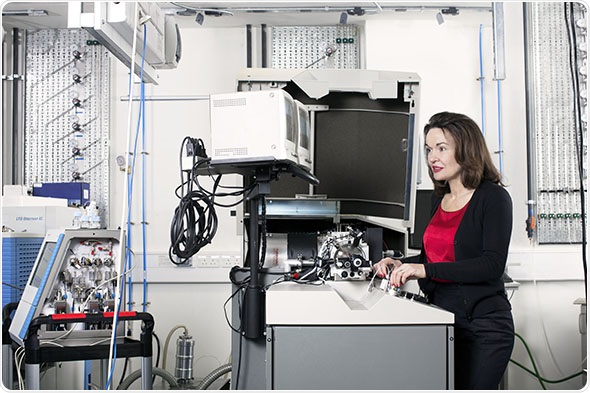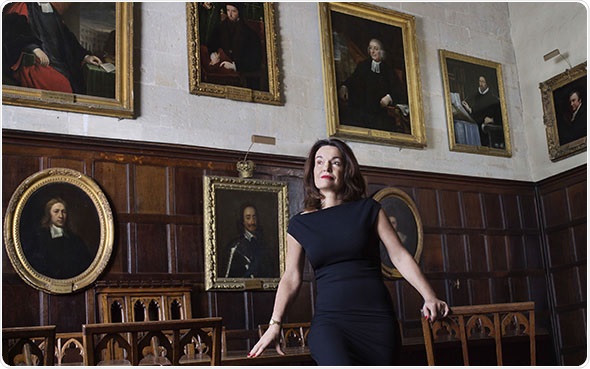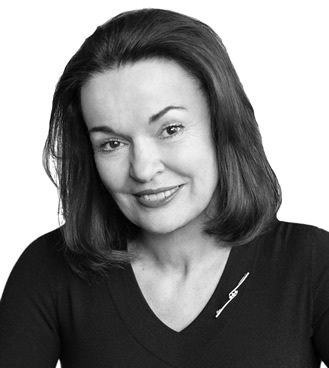I work on membrane protein complexes – they act as the gatekeepers to cells controlling the import and export of molecules in and out of cells.
This means they control how drugs are trapped within the cells. They can open and close and let the drug back out of the target cell, making the drug less efficient.
The better we understand how these gatekeepers work, the better we can design drugs for a range of conditions.
What impact do you think this award will have on your research?
It’s too early to say – I’ve only just won this award! But I will definitely be using some of the money to improve women’s networking initiatives here in Oxford.
How important do you think the “L’ORÉAL-UNESCO For Women In Science” awards are on encouraging women into the world of science?
The programme highlights women in science and I think this is a great idea. I am particularly proud of this one because I like what the L’Oreal foundation has set out to do.
I hope it has a very positive effect on young women considering a career in science as there are so many positives about being a scientist.
One of the main issues is the lack of role models with whom women can identify. When I was young there were none (apart from the obvious Dorothy Hodgkin or Marie Curie).
Nowadays, we are seeing more women and I think programmes like the L’Oreal-UNESCO For Women In Science Awards are helping to put women scientists on the world stage and to celebrate their successes.

What more do you think needs to be done to make science appeal to women?
I think the environment can be off putting for a lot of women and this is a great shame. It doesn’t have to be like that. I don't believe you have to work 24/7 to be a scientist.
You can be thinking about science while away from the lab. I often have my best ideas while running round the university parks.
The long hours culture is in conflict with family life, and life in general and in my opinion this is the biggest perceived obstacle for women but a career in science is tremendously rewarding and exciting - women should not be put off by perceptions.
In my career I benefitted enormously from good mentoring and I feel this is an important part of getting women to stay, and progress, in science. More programmes do now exist to address this but there is still a lot more we can do.
What are the main things you enjoy about being a scientist?
I started on the mass spectrometer at the age of 16 at Pfizer and loved it from the start. I like the practical challenge the sense of achievement that comes with carrying out my first experiments.
I still get the same satisfaction to this day if I see a beautiful mass spectrum of something very difficult to obtain. I also really enjoy interacting with my group, watching them grow in confidence and ability.
UK scientist receives global honour at 17th Annual L’ORÉAL-UNESCO For Women in Science Awards.
Can being an academic be a flexible career?
Being an academic is a very flexible career, particularly if you have outside commitments. There are times when I have worked incredibly hard - less so when my children were young. Now that they have all left home I am totally free to work at my own pace again.
How difficult is it to balance a family and a scientific career?
Balancing family and career was my biggest challenge. Initially, I resolved this by giving up my scientific career for eight years; later I managed to find the right balance between the two things that mattered most to me.
I did this by working in the early hours of the morning but it was hard when the children were young and I had to travel abroad to conferences and collaboration meetings, I missed them terribly whilst I was away.
But I knew how important it was to get my work out there and known on the international circuit. I just had to get on with it.
I am strong advocate of how flexible a career in science can be: I never missed a school play or a sports day and made every effort to get to the school gates to pick up my children whenever I could.

What advice would you give any women considering science as a career path?
You can have a great career if you really enjoy science. It is important to follow your passion and to be committed. There are so many positives - don’t think of it as being stuck in the lab all day.
The opportunities to present your research, to interact at conferences and to carry out collaborations across the world are tremendously exciting.
It is also very rewarding working with bright young students, watching them develop and take up their own careers. It really is a great career choice.
Where can readers find more information?
www.forwomeninscience.com
About Professor Dame Carol Robinson
Professor Dame Carol Robinson manages her research group from the Physical and Theoretical Chemistry Laboratory at the University of Oxford, she is a Fellow of the Royal Society, a fellow of the Royal Society of Chemistry and a Fellow of Exeter College, Oxford.
Carol’s career path is particularly inspiring: she left school at 16, then studied part-time whilst working, and then took an eight-year career break to raise her children before returning to academia.
She was the first female Professor of Chemistry at the University of Cambridge and then the first female Professor of Chemistry at the University Oxford. She has just been announced as the “L’Oréal-UNESCO For Women In Science” European Laureate for 2015.